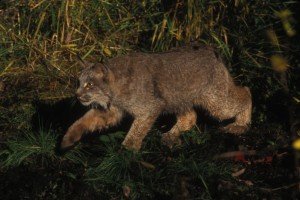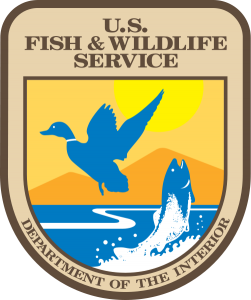 The U.S. Fish and Wildlife Service is currently considering an application by the Maine Department of Inland Fisheries and Wildlife for an incidental take permit for Canada lynx. The ITP would provide legal protection for the Department’s trapping program and trappers who incidentally capture lynx, which are protected under the Federal Endangered Species Act. In return, the Department has taken measures to minimize the chances that lynx will be taken in traps, and minimize mortality to lynx that are caught. For the few possible mortalities that could occur, the Department has agreed to provide mitigation to minimize impacts to the lynx population.
The U.S. Fish and Wildlife Service is currently considering an application by the Maine Department of Inland Fisheries and Wildlife for an incidental take permit for Canada lynx. The ITP would provide legal protection for the Department’s trapping program and trappers who incidentally capture lynx, which are protected under the Federal Endangered Species Act. In return, the Department has taken measures to minimize the chances that lynx will be taken in traps, and minimize mortality to lynx that are caught. For the few possible mortalities that could occur, the Department has agreed to provide mitigation to minimize impacts to the lynx population.
 The ITP comes on the heels of several lawsuits from animal rights groups to attempt to limit trapping in Maine.
The ITP comes on the heels of several lawsuits from animal rights groups to attempt to limit trapping in Maine.
If issued, the Incidental Take Permit would last for a 15 year period.
A brief review of what the document means to Maine’s trapping program can be read by clicking here.
Click here to read the full ITP document.
The USFWS Draft EA can be found here.
The USFWS is accepting public comment on the ITP application through February 7, 2012. Comments can be mailed in or emailed to: hcpmainetrapping@fws.gov
Several public meetings have already been held, but public comment is still being accepted. See the press release below:
News Release Contact:
11/08/2011 USFWS, Meagan Racey, 413-253-8558/413-658-4386
MDIFW, Walter Jakubas, 207-941-4471
Wildlife agencies announce request for lynx permit
Public invited to comment on draft plan for Maine trapping program
The Maine Department of Inland Fisheries and Wildlife has applied to the U.S. Fish and Wildlife Service for a permit to authorize incidental take of federally protected Canada lynx resulting from the state-regulated trapping program.
The Service invites the public to comment on MDIFW’s draft incidental take plan, a requirement for the permit. The Service also invites comment on its draft environment assessment for MDIFW’s application.
The Endangered Species Act makes it illegal to “take”—meaning trap, capture, harass, harm or kill—federally threatened or endangered wildlife, such as the threatened Canada lynx. Some legal activities, such as trapping, have the risk of incidentally taking protected species. An incidental take permit allows for those activities to continue, as long as the permittee undertakes reasonable and practical measures to avoid, minimize and mitigate take of listed species.
“The incidental take permit that MDIFW has applied for should provide assurance to Maine’s trapping community and the general public that trappers can continue to pursue their avocation in northern Maine without detriment to the state’s lynx population,” said Wally Jakubas, MDIFW Mammal Group leader.
Incidental take plans, known also as habitat conservation plans, identify the impacts to wildlife from a project or program; the steps the applicant will take to reduce or compensate for such impacts; what alternative actions were considered; and how conservation efforts will be funded.
“Habitat conservation plans provide frameworks for partnerships in endangered species conservation,” said Paul Phifer, assistant regional director for the Service’s Northeast Region Ecological Services program. “The measures in this plan will help both agencies continue to protect lynx across the state for the benefit of future generations.”
The Service and MDIFW will hold informational sessions on the draft plan and related assessment in December:
December 13 at University of Maine at Presque Isle, 181 Maine Street, Presque Isle, 04769 (Grand Ballroom—Allagash and Aroostook rooms); 207-768-9502
December 14 at Black Bear Inn, 4 Godfrey Drive, Orono, 04473; 207-866-7120
December 15 at University of Southern Maine in Gorham, 37 College Avenue, Gorham, 04038 (Bailey Hall); 207-780-5961
The Service and MDIFW are accepting written comments on the draft plan and environmental assessment through February 7, 2012. After the comment period ends, the Service will determine whether the application meets the permit issuance requirements. Send comments to hcpmainetrapping@fws.gov or to the Service’s Maine Field Office at 17 Godfrey Drive, Suite 2, Orono, Maine 04473. Comments sent through U.S. mail should be postmarked no later than February 7, 2012, to be considered
Click here for a shortened explanation of the highlights of the ITP. You are encouraged to provide comments on the plan. Remember, these can be submitted to hcpmainetrapping@fws.gov.
Leave a Reply